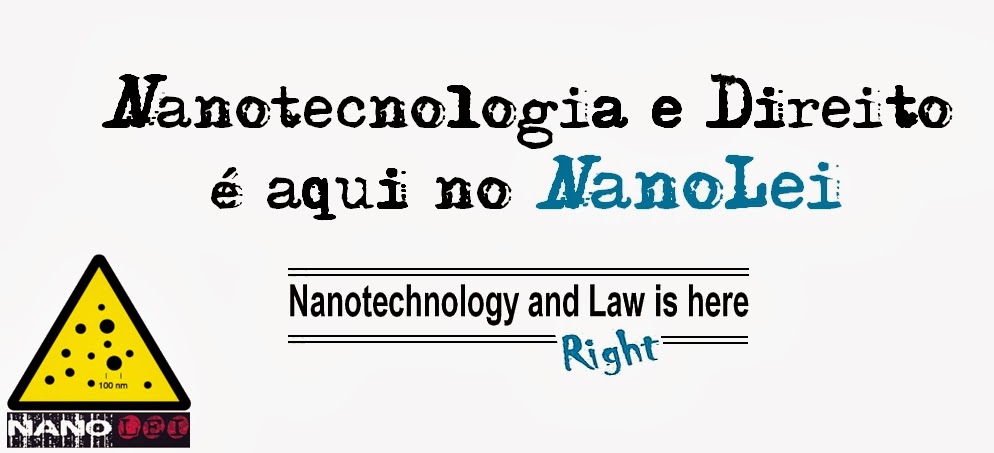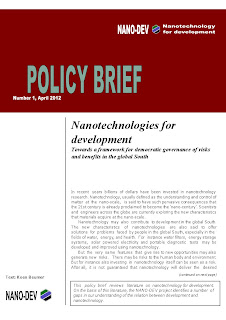This first NANO-DEV policy brief reviews literature on nanotechnologies for development. On the basis of this literature, the NANO-DEV policy brief identifies a number of gaps in our understanding of the relation between development and nanotechnology.
The key message of the policy brief is that nanotechnology can have both positive and negative consequences for countries in the global South. These should be pro-actively dealt with.
The positive consequences of nanotechnology include direct benefits in the form of solutions to the problems of the poor and indirect benefits in the form of economic growth.
The negative consequences of nanotechnology include direct risks to human health and the environment and indirect risks such as a deepening of the global divide.
Core challenges to harnessing nanotechnology for development include risk governance, cultures of innovation, knowledge brokerage and travelling technology.
The entire policy brief can be found here.
Nanotechnology is a label for technologies at the nano-scale, roughly between 1 and 100 nanometers. This is extremely small. By comparison, the diameter of one human hair is about 60,000 nanometers. At this scale materials acquire all sorts of new characteristics that can be used in a wide range of novel applications. This potentially includes cheaper and more efficient technologies that can benefit the world’s poor, such as cheap water filters, efficient solar powered electricity, and portable diagnostic tests.
But in order for nanotechnology to contribute to development, several challenges are faced in the social domain. For instance transferring nanotechnology from the laboratory to the market is by no means an easy task, nor is involving people as diverse as researchers, industry captains, government officials and the public. And when the potential risks of nanotechnology are not dealt with in an adequate way, the development of nanotechnology will be hampered. Even more, already in the laboratory the way these issues are taken into account impacts upon its eventual use for development.
This research project focuses on these social issues.
Four PhD researchers involved in the project will focus on cultures of innovation, knowledge brokerage, travelling technology, and risk governance in Kenya, India and the Netherlands (see projects). The research team consists of prof. dr. ir. Wiebe E. Bijker, dr. Ragna Zeiss, Charity Urama, Pankaj Sekhsaria, Trust Saidi and Koen Beumer. The program is coordinated by Maastricht University, Netherlands.
The key message of the policy brief is that nanotechnology can have both positive and negative consequences for countries in the global South. These should be pro-actively dealt with.
The positive consequences of nanotechnology include direct benefits in the form of solutions to the problems of the poor and indirect benefits in the form of economic growth.
The negative consequences of nanotechnology include direct risks to human health and the environment and indirect risks such as a deepening of the global divide.
Core challenges to harnessing nanotechnology for development include risk governance, cultures of innovation, knowledge brokerage and travelling technology.
The entire policy brief can be found here.
About us
Nanotechnology for development is a research project that aims at understanding how nanotechnology can contribute to development. By investigating way people deal with nanotechnology in Kenya, India and the Netherlands, the project will flesh out appropriate ways for governing nanotechnology for development.Nanotechnology is a label for technologies at the nano-scale, roughly between 1 and 100 nanometers. This is extremely small. By comparison, the diameter of one human hair is about 60,000 nanometers. At this scale materials acquire all sorts of new characteristics that can be used in a wide range of novel applications. This potentially includes cheaper and more efficient technologies that can benefit the world’s poor, such as cheap water filters, efficient solar powered electricity, and portable diagnostic tests.
But in order for nanotechnology to contribute to development, several challenges are faced in the social domain. For instance transferring nanotechnology from the laboratory to the market is by no means an easy task, nor is involving people as diverse as researchers, industry captains, government officials and the public. And when the potential risks of nanotechnology are not dealt with in an adequate way, the development of nanotechnology will be hampered. Even more, already in the laboratory the way these issues are taken into account impacts upon its eventual use for development.
This research project focuses on these social issues.
Four PhD researchers involved in the project will focus on cultures of innovation, knowledge brokerage, travelling technology, and risk governance in Kenya, India and the Netherlands (see projects). The research team consists of prof. dr. ir. Wiebe E. Bijker, dr. Ragna Zeiss, Charity Urama, Pankaj Sekhsaria, Trust Saidi and Koen Beumer. The program is coordinated by Maastricht University, Netherlands.
Fonte: NANO-DEV

